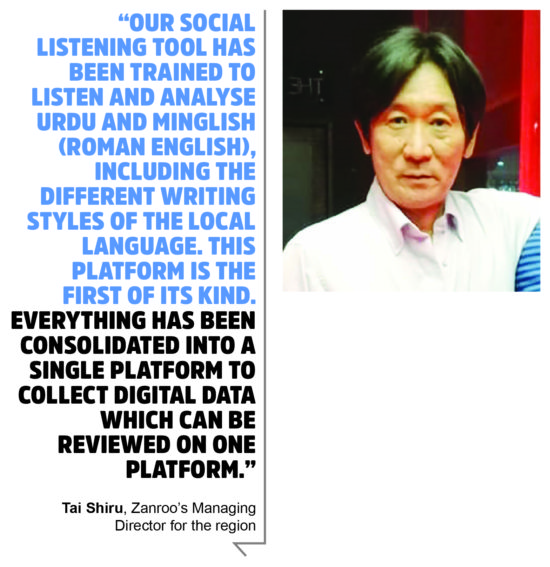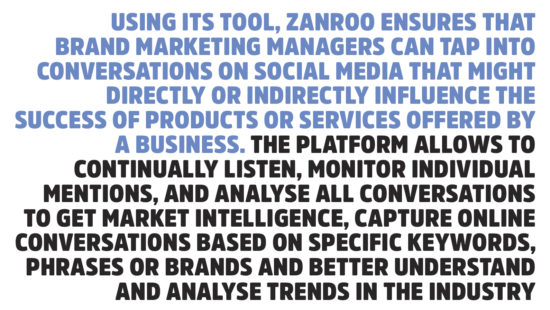With the digital space expanding at breathtaking speed and the number of users on social media increasing exponentially, digital media marketers have turned to another form of gathering data on potential customers – a practice called “social listening”.
Social listening is progressively becoming an important facet of social media marketing because users are generating tons of data that strategies like these can help monetize. According to several estimates, social media users around the globe post about 500 million tweets, five billion Facebook likes and 95 million new Instagram photos and videos daily. Seventy-two percent of all internet users are active on social media and 81% of the consumers’ purchasing decisions are influenced by their friends’ social media posts.
McKinsey Global estimates that companies can unlock a massive $200 billion in annual value through social media technologies as over 50% of consumers are more likely to buy a product from a company that they can contact via social media. Such cosmic rise in social media activity means that brands need to understand customer’s needs as well as how to engage with them. This is where social listening comes in.
What exactly is social listening? Recall the many times you were startled to see an ad appear on Instagram or Facebook about a product you’ve been thinking about. How do they know you want it or are interested in it? They are “listening”.
Hootsuite, one of the world’s most popular social media management platform, defines social listening as “the process of monitoring social media channels for mentions of your brand, competitors, product, and any other ideas or themes that are relevant to your business.”
Another social media management platform Sprout Social explains that “social listening goes beyond monitoring and replying to incoming questions or comments about your brand. It’s about extracting key insights from social conversations that you can apply to your overall strategy.”

Through social listening, businesses are able to listen out for every mention of their brands on popular social media platforms and filter out the noise to gain a thorough understanding of brand-relevant conversations in social channels. Simply put, businesses use social listening to track what people are saying about a brand – negative or positive — that helps to analyse the overall sentiment that is prevailing about that brand and monitor trends around it. These valuable insights are then utilised to formulate effective marketing strategies to improve the overall health of the brand and improve customer experience.
Pakistan has over 60 million online users with a penetration rate of 27%, which highlights the fact that the country has a fast-growing online population. With the rapid increase in social media usage in the country, consumers are expressing and sharing their opinions about products, providing companies the opportunity to “listen” to their preferences.
With this in mind, Thailand-born marketing technology (MarTech) company Zanroo is bringing its coveted platform and a social listening tool to Pakistan in a partnership with leading Pakistani digital agency Bramerz. Launched in 2013, Zanroo is being used globally by a variety of brands that span the industries of banking, automotive, telecom, e-commerce, aviation, and consumer goods sectors.
But its biggest leverage point is that it understands Pakistan’s native language, Urdu.
“Our social listening tool has been trained to listen and analyse Urdu and Minglish (roman English), including the different writing styles of the local language,” Tai Shiru, Zanroo’s managing director for the region, told Profit. “This platform is the first of its kind. Everything has been consolidated into a single platform to collect digital data which can be reviewed on one platform.”
Bramerz co-founder and Vice President of Growth Badar Khushnood concurred, asserting that Zanroo’s platform is a complete tool with a number of features and that no such tool is available in the market. Due to its unique nature, however, the product is only available to businesses.
Is the Pakistani market ready?
According to a representative of a leading digital marketing agency based in Lahore, social listening in Pakistan is in the nascent stages and hardly anyone is aware of this technique. “At present, social listening is famous in developed countries and they have created tools that can listen to conversations in their native language. In Pakistan, it is yet to begin,” the representative told Profit, agreeing that Zanroo’s appeal would lie in its localization. “As the trend is just starting out, social listening tools currently available are not local and therefore unable to monitor conversations in the local language.”
According to Zanroo, their tools will provide a holistic view of how consumers view a specific brand and/or business along with how they perceive its competitors. With the presence of a multilingual localised dictionary, it will become easier for brands to listen to the conversations, as people make use of more than one language in their conversations as is common in Pakistan. Moreover, the tool will also provide an insight into what people are talking about on any trending issue or event, providing cutting-edge and near real-time crisis management.
Using its tool, Zanroo ensures that brand marketing managers can tap into conversations on social media that might directly or indirectly influence the success of products or services offered by a business. The platform allows to continually listen, monitor individual mentions, and analyse all conversations to get market intelligence, capture online conversations based on specific keywords, phrases or brands and better understand and analyse trends in the industry.

On the other hand, Bramerz plans to use the platform to gain valuable insights required to expand and optimize different brands’ marketing strategies and perceptions. They are also interested in using data gathered to Zanroo’s platform to conduct real-time competitive analysis and online market research instead of having to conduct face-to-face focus groups and traditional surveys.
As a pioneer in the field, Bramerz has to its credit projects like Pakistan Super League (PSL) and Uber Pakistan and has served multinational giants like Nestlé, Unilever, Levi’s, Samsung, and PepsiCo.
Zanroo knows marketing, but does it know the internet?
The internet is a tricky space. Millions of bots automated to do a task repeatedly have infested the internet as quickly as it has expanded. Social media hasn’t been able to fend off this digital epidemic either. Take Twitter, for example. A 2017 study suggested that anywhere between nine to 15% of active Twitter accounts are bots. That translates into approximately 48 million bots per month posting tweets without any direct human involvement. To lessen the flow of disinformation on the platform, in May and June alone this year, Twitter suspended as many as 70 million accounts – more than 1 million accounts in a day – that were deemed to be fake. The purge was initiated after Russia was alleged to have influenced the 2016 US presidential elections through social media channels.
Similar actions were taken on Facebook. In a report, Facebook revealed that it deleted 865.8 million posts in the first quarter of 2018, besides removing 583 million fake accounts in the same period. That is more than a quarter of Facebook’s 2.2 billion monthly active users.
Unfortunately, this tool developed by Zanroo is unable to monitor fake social media accounts and bots. “There is no way for us to know if an account is real or not. However, if an account is posting the same thing repeatedly, we can mark it as spam and discard it,” Tai Shiru said.








